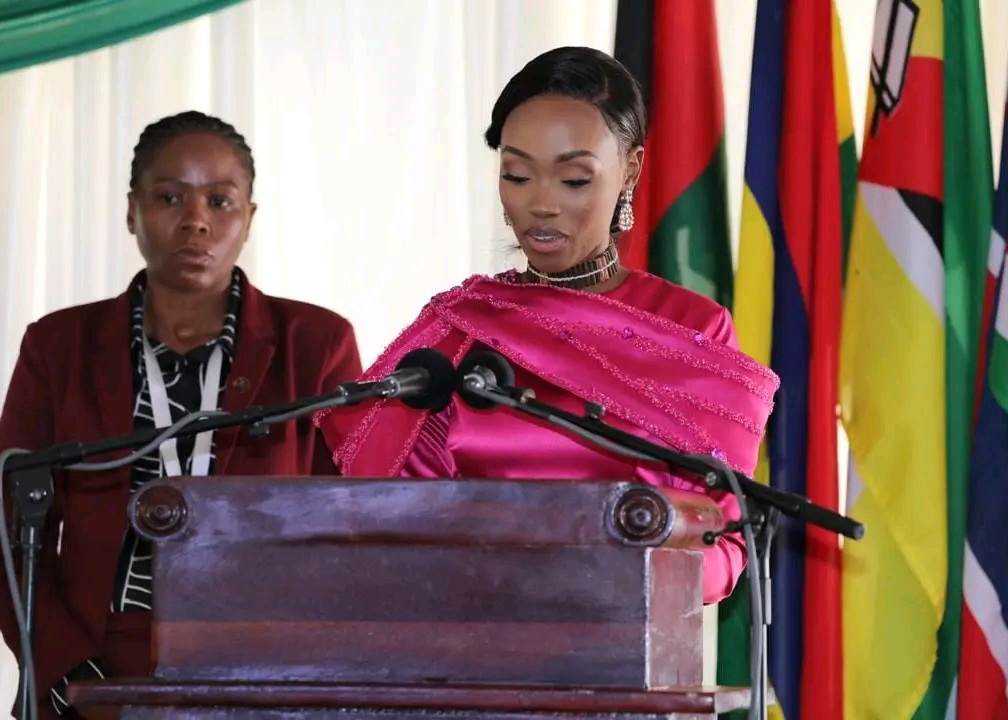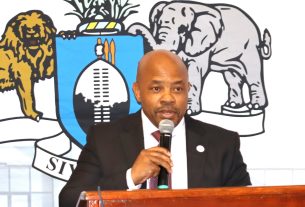HARARE, ZIMBABWE – Inkhosikati Make Mashwama has praised the pivotal role played by women in the conservation of the environment.
She said as caregivers and managers of natural resources in their communities women play a key role in environment stewardship.
The Inkhosikati was speaking at the launch of the Southern Africa First Ladies for Environment Forum at Geo Pomona Waste Management Company, which was hosted by Zimbabwe First Lady Dr. Auxillia Mnangagwa and attended present were First Ladies of Angola, Malawi and a representative of Sychelles.

She appreciated the invite from Madam Mnangagwa, who is the person behind the First Ladies Environment Forum patron as she is championing waste management practices through awareness programmes and waste management training in Zimbabwe.
Dr Mnangagwa is credited for having led a programme which saw the citizens planting 21 million trees and engaging monthly on monthly national clean up campaigns.
Inkhosikati said it is important to empower women to take leadership roles in environmental issues, where unique perspectives and experiences can be utilised to drive sustainable solutions.
It is an honor to stand before you today as we embark on this important tour of this prestigious waste management facility. I would like to extend my heartfelt gratitude to H.E. Dr. Auxillia Mnangagwa, our ENVIRONMENT PATRON, for championing good waste management practices through awareness programmes and waste management training.
Women play a crucial role in environmental stewardship. They are often the primary caregivers and managers of natural resources in their communities. It is of paramount importance to therefore empower women to take leadership roles in environmental issues, where their unique perspectives and experiences can be utilized to drive sustainable solutions.
“As we gather here, it is essential to recognize the critical role that effective waste management plays in safeguarding our planet.
“In an age where environmental challenges loom large, from climate change to pollution, the work being done within this facility is not just about managing waste, it is about creating a sustainable future for generations to come. Waste management is not merely a logistical challenge, it is a moral imperative. It reflects our commitment to preserving the earth’s resources, protecting public health, and fostering a cleaner, greener environment,”she said.
Inkhosikati said Eswatini generates approximately 700 tonnes of waste daily, saying that is a significant amount and needs to be managed effectively.
“About 60 per cent of this waste is biodegradable, and can be composted and returned to the earth. This presents an opportunity, as it shows that there is a great potential for composting and other sustainable waste management practices. This is an area where we need significant improvement to ensure proper waste management across the country,” the Inkhosikati said.
She said the SADC region remains most vulnerable to the effects of poor waste management as it significantly contributes to climate change.
Inkhosikati LaMashwama said these impacts include more frequent and severe droughts, floods, and cyclones, threatening food security, water resources, and livelihoods across the region.
“In Eswatini, the increasing frequency of droughts is particularly concerning, as it directly affects agriculture, the backbone of our economy.
“Our efforts as a Kingdom to address climate change remains resolute in reducing greenhouse gas emissions by 14 per cent by 2030. To achieve this target, we require collective effort, particularly from our international partners in the form of finance, technology transfer and capacity building. This therefore calls for urgent collective action to address waste management, not only through mitigation efforts but also by building resilience in our communities,” she said.
The concerns around the environment emanates from the 2016 Paris Agreement where world leaders committed themselves to strengthen the global response to the threat of climate change by keeping a temperature rise this century well below 2 degrees Celsius, which is above pre-industrial levels.
Further the agreement aims to pursue efforts to limit the temperature increase even further to 1.5 degrees Celsius. The objective is to increase the ability of countries to deal with the impacts of climate change and at making finance flows consistent with a low green house gas emissions and climate-resilient pathway.
Before touring the Geo Pomona Waste Managent Company, Inkhosikati and the other First Ladies Inkhosikati planted a tree which was named after her name; Inkhosikati LaMashwama.
The Geo Pomona Waste Management Company was established in April 2022. It is the project entity created to carry out the Waste to Energy Project at Pomona.
This project is a Joint Venture Concession Agreement between the City of Harare and Geogenix BV.
Geo Pomona Waste Management specialises in modern sustainable solutions for waste management.
The Pomona site was previously a textbook case of a mismanaged dumpsite. Various stakeholders used it for waste dumping without any oversight.
The area was plagued by recurrent fire outbreaks due to gas build-up in the landfill, often taking months to extinguish. These fires emitted thick smoke, causing severe air pollution, blanketing nearby areas, and forcing residents to inhale potentially harmful fumes. This not only caused respiratory problems and eye irritation but also posed long-term health risks.
The site was a severe environmental hazard, producing unbearable smells and posing dangers to both the environment and the people of Harare. It lacked access roads and proper waste management infrastructure, attracting large numbers of squatters scavenging through the waste. This situation exacerbated the already dire conditions.
Unchecked waste attracted pests like rats and flies, spreading diseases. Rainwater percolating through the landfill dissolved contaminants from decomposing waste, creating a toxic liquid known as leachate. Due to the absence of a proper liner, leachate seeped into the ground, causing severe ground pollution and polluting nearby water sources. The unchecked pollution from the site, including air pollution, water pollution, and ground pollution, was significant and posed serious health and environmental risks.







